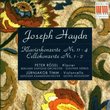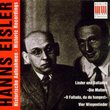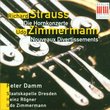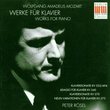| All Artists: Hanns Eisler, Max Pommer, Heinz Rogner, Leipzig Chamber Music Association of the Gewandhaus Orchestras, Berlin Radio Symphony Orchestra, Volker Brautigam, Gerhard Erber Title: Hanns Eisler: Works for Orchestra, Vol. 1 Members Wishing: 0 Total Copies: 0 Label: Berlin Classics Release Date: 6/18/1996 Genres: Special Interest, Classical Styles: Marches, Symphonies Number of Discs: 1 SwapaCD Credits: 1 UPC: 782124922825 |
Search - Hanns Eisler, Max Pommer, Heinz Rogner :: Hanns Eisler: Works for Orchestra, Vol. 1
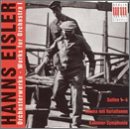 | Hanns Eisler, Max Pommer, Heinz Rogner Hanns Eisler: Works for Orchestra, Vol. 1 Genres: Special Interest, Classical |
Larger Image |
CD DetailsSimilar CDs |
CD ReviewsMusic for the masses--and a surprising twist Andrew G. Lang | Cleveland, OH USA | 09/14/2002 (5 out of 5 stars) "Recorded in 1970s East Germany by the famed Leipzig Gewandhaus Orchestra, this sampling of Hanns Eisler's short chamber works (four suites based on the scores for early sound films and a highly-compressed "Chamber Symphony" composed in the 1940s) showcases Eisler's lifelong quest for "communicative" music oriented towards social reality.The four suites are all strictly tonal, and echo Eisler's work of the same period with Bertolt Brecht's radical political theater. They include music for the leftist antiwar movie "No Man's Land"--a film that so enraged the Nazis they tracked down and destroyed every copy.But the Chamber Symphony is a surprising return to the "modern" twelve-tone style of his teacher, Arnold Schoenberg. Composed in the early 1940s (during Eisler's exile in the U.S.) as film music for a documentary on the Arctic ice sheet, it was an experiment in applying the twelve-tone method to film in a way that would engage an ordinary audience. The innovative use of electronic instruments with a small chamber ensemble effectively communicates both the intense cold portrayed in the documentary and the glacially slow but powerful movement of the Arctic ice mass. But the music, while pictorial, also has a connection with the movement of historical forces--as one would expect from a politically-engaged composer like Eisler. According to Eisler scholar Günter Mayer (in his notes for the Berlin Classics CD of this music), "whilst working on the final version ... he had followed reports on the radio about the invasion of France and Paris by the fascist troops (summer 1940). In consequence, the sharp contrasts between assaultingly shrill and lyrically tender sounds stand for his experience of the brutality of fascism and the barbaric destruction of human relationships."While the music is definitely "modern" in contrast to his strictly tonal political compositions in Berlin before Hitler's seizure of power, Eisler's rejection of abstract or strictly concert music is evident in this composition. Like other anti-romantic composers of the era he works with abbreviated and rapidly shifting forms--a "montage effect" characteristic of Weimar art and one suitable for the fast-paced tempo of an experimental film. Like his other "applied" chamber works of the same period, the Chamber Symphony reinforces Eisler's reputation as one of the most expressive and reachable composers in the twelve-tone idiom." Another side of the fellow traveler Larry VanDeSande | Mason, Michigan United States | 11/19/2007 (5 out of 5 stars) "If you only know the communist composer Hanns Eilsler (1898-1967) by his most famous works -- the angst-ridden and bitter Hollywood Songbook and the proletarian-induced Deutches Sinfonie -- you will be in for a surprise if and when you acquire this fabulous collection of "orchestral" works.
I put orchestral in quotes because it's a stretch to call these chamber pieces orchestral. The five suites are written for collected arrangements of double bass, woodwinds and brass (including saxophone) and the chamber symphony adds a piano and Hammond organ. The suites come primarily from music Eisler wrote to accompany film scores and they reflect various states of happiness not generally associated with the German expatriate. I would characterize the emotions of the suites as varying from cabaret enjoyment to circus hijinks to a gypsy dance to the mystery of a Bernard Herrmann film score for Hitchcock. The five-movement chamber symphony is more serious but only by degree. When I first played this CD everthing sounded a lot alike in the relatively brief movements and 3-5 part construction. Elongated listening has helped me hear the subtle changes that go on, not only inside each piece, but between them as the opus numbers increase. An additional item, Theme and variations "The Long March", is an 8-minute bonus to this wonderful CD. Max Pommer's direction is lively, extrovert and expert in these scores. He is ably abetted by participating members of the Leipzig Gewandhaus chamber group, Gerhard Erber on piano and Volker Brautigan on the organ. Anyone with the least interest in communism, German expressionism from the 1920s and 1930s, or Hanns Eisler should acquire this CD as soon as humanly possible. On top of all the other plaudits, the sound is astonishingly successful." |

